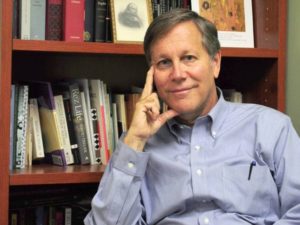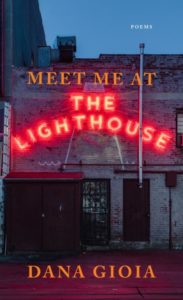Dana Gioia explores memory and family stories
Flashback to 20 years ago: I had a cousin who’s about 15 years older than I am. Out of the blue, she began calling. I had become the keeper of the family Bible, and she needed information from the family records section. Several phone calls ensued. I was slightly tickled at how ardent she was about pursuing family history. Years later, I understood. I was doing the same thing, chasing down certain death notices, military listings, and cryptic notices left by others on Family Search and Ancestry.com. (And when did I join those websites?)
You reach a certain age, and certain things become more important than they once were. This is not unusual; in fact, it’s a common development once you reach your 60s. Art becomes more important. So does great literature (the stuff that’s lasted). And genealogy, as if we need to know where we came from before we become just another record in the family Bible.
Ask Dana Gioia (1950-). Better still, read his new poetry collection, Meet Me at the Lighthouse: Poems. It’s not a nostalgic collection; Gioia is too clear-eyed a poet to start looking backward and remembering only the good parts. But it is a collection about family, about memory, about growing up, and about what once was but is no longer.

Dana Gioia
The lighthouse of the title poem is a “shabby nightclub on its foggy pier” in Hermosa Beach, California, summer of 1971. The music is jazz; the company is a cousin who will die in the not too distant future and “Dr. Death” who’s “keeping the tab.” No, this isn’t nostalgia.
Or try “The Ballad of Jesus Ortiz,” the story of Gioia’s great-grandfather. In Santa Clara Magazine, he describes a conversation between his 10-year-old self and his Mexican grandfather, who quit school with his brother when they were boys because their father had been shot dead in frontier Wyoming and they had to support the family. That more than 60-year-old conversation became the ballad, the story of his great-grandfather’s life and death. (That story personally resonated; my own family stories include one about a great-grandmother who shot a man dead, not in the frontier West but in Louisiana.)
Gioia’s poems are not all about family, but they are all about memory. He has several about Los Angeles and California, where he was born and raised, titled in almost religious terms like “psalms” and “a lament.” And he writes descriptive lines like “The boulevards unfold in brilliant lines. / The freeways flow like shining rivers.” These are poems for a city and a geography that, with all their faults, he still loves and holds closely in memory.
He also writes about themes familiar to poetry, including journeys and travel.
At the Crossroads

Under the quarter moon to cast their spells,
And where young loves meet to argue out
The secret terms of their surrender.
It is a place that each sees differently—
The salesman scouting, soldiers tramping home,
The scholar napping by the riverbank
While someone else’s fortune drifts downstream.
But if you stand at crossroads long enough,
Most of the eager world comes strutting by—
Businessmen, preachers, cats—all going somewhere,
Even the Devil striking up a deal.
I used to wonder if they ever got there.
Be careful here in choosing where to turn.
You learn a lot by staying in one place
But never know how the story truly ends.
Gioia is the former poet laureate of California and chairman of the National Endowment for the Arts. He received his B.A. and M.B.A. degrees from Stanford University and his M.A. in comparative literature from Harvard. He worked in business marketing for 15 years before becoming a full-time writer. He’s published five poetry collections, four books of criticism, and four opera libretti. The recipient of numerous awards and recognitions, he’s also received 10 honorary doctorates.
I expected that I’d like Meet Me at the Lighthouse, and I did. I didn’t expect to see my own concerns and preoccupations as much as I did. And I didn’t anticipate that the poems of a poet of Italian and Mexican heritage would sound so much like my own family and my own family’s history. But they did. Dana Gioia has a gift for expanding the personal into the universal.
Related:
I Need to Tell You About My Interesting Brother – Ted Gioia at The Honest Broker
Dana Gioia’s “Pity the Beautiful: Poems”
Poetry at Work: Dana Gioia and “Can Poetry Matter”
Poetry at Work: Dana Gioia on Poetry in Business
By Heart: ‘California Hills in August’ by Dana Gioia
Photo by Simon Harrod, Creative Commons, via Flickr. Post by Glynn Young.
How to Read a Poem uses images like the mouse, the hive, the switch (from the Billy Collins poem)—to guide readers into new ways of understanding poems. Anthology included.
“I require all our incoming poetry students—in the MFA I direct—to buy and read this book.”
—Jeanetta Calhoun Mish
- Longfellow’s “Paul Revere’s Ride”: Creating a National Legend - April 17, 2025
- Poets and Poems: Katie Kalisz and “Flu Season” - April 15, 2025
- Poets and Poems: Michelle Ortega and “When You Ask Me, Why Paris?” - April 10, 2025


Bethany says
“I expected that I’d like Meet Me at the Lighthouse, and I did. I didn’t expect to see my own concerns and preoccupations as much as I did. . . .Dana Gioia has a gift for expanding the personal into the universal.”
Thank you for this, Glynn.
Glynn says
Thanks for commenting, Bethany! I’m glad you enjoyed it.
Katie S Brewster says
“You reach a certain age, and certain things become more important than they once were. This is not unusual; in fact, it’s a common development once you reach your 60s. Art becomes more important. So does great literature (the stuff that’s lasted). And genealogy, as if we need to know where we came from before we become just another record in the family Bible.”
I have found this holding true in my experience, Glynn. When we took our children to museums when they were growing up, I would notice that so many of the visitors were grey or white-haired. Now I’m in that group;)
Dana Gioia has been a guest on The Trinity Forum and I have gleaned much practical and poetic insight from his conversations there.
Your ending statement that he “has a gift for expanding the personal into the universal” was certainly evident in his talks.
Grateful once again for your reviews. I’m looking forward to finding his new collection.
Katie
Glynn says
Thanks, Katie. It may be a matter of time — that we have more time for art museums and reading when we’re older. But I think it’s also that we’re beginning to sense the eternal. and we’re better able to see what really matters.